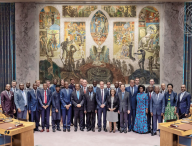Concerns about the evolution of income inequality within countries have become an important element of public debate all over the world. While inequality reduction is a key global target reflected in the Sustainable Development Goals (SDGs), actual trends have been mixed at best. We know that over the past two decades, earnings inequality has increased, decreased, and remained roughly the same, depending on the country of study, but the reasons why are less clear.
This project addresses this crucial knowledge gap by investigating the main drivers of observed trends in earnings inequalities within developing countries. By extending the knowledge frontier in this arena, this project will contribute to global understandings of what factors can reduce earnings inequalities and the extent to which such reductions can help to achieve SDG10 (Reduce inequality within and among countries).
Specifically, this project addresses the knowledge gap on how the changing nature of work may affect earnings inequality in the Global South. Recent advancements in what determines workers’ earnings indicate that the task content of an occupation may play an important role. Studies in this literature tend to explain increases in inequality levels through the evolution of the task structure within the labour market, pointing to higher pay for less routine-task intensive work and lower pay for more routine work. The impact of economic development, globalization, trade liberalization, technological change, and other changes to the nature of economic production on the task structure of the jobs available could therefore be an important driver of changes to earnings inequality. To date, the advancements in this field have focused solely on high-income countries. This project initiates a new economic literature on the link between changes in the task composition of jobs and changes in earnings inequality by extending the analysis to developing economies.
In this context, the project investigates the following key questions:
How has the nature of work changed during the development path followed by different countries and regions of the world, and how is this impacted by the globalization of trade and new technology or labour market institutions?
Do factors like a country’s position in the global value chain, access to technology, and labour market institutions matter?
To what extent are changes in employment and earnings of more (and less) routine jobs affecting inequality and labour market polarization in the Global South?
How does the nature of earnings inequality in developing countries differ from the experience of developed countries?
In order to address these questions, the project has gathered a good combination of senior and junior researchers, mostly from the developing world, to produce in-depth examinations of a heterogenous set of eleven countries at different stages of development and in different regions of the Global South: Tunisia (North Africa), Ghana and South Africa (sub-Saharan Africa), India and Bangladesh (South Asia), China and Indonesia (East Asia), Argentina, Brazil, Chile and Peru (South America). Together with a cross-country study of the global trends, these examinations will be the first to take recent scholarly advancements on these questions and apply them to developing countries.
Within the framework of UNU-WIDER’s 2019-23 work programme, the project contributes to the three interlinked outputs of the Institute’s ToC of Creating, Strengthening, and Exchanging Knowledge In order to tackle the development challenge of transforming societies, the project increases the knowledge, capacities, and confidence of stakeholders to achieve reduced inequalities in the labour markets of developing countries.
Upon the launch of the UNU-WIDER Work Programme 2019-2023 the research programme was divided into 6 flagship projects. Two years into the work programme these flagships have matured into several standalone projects, of which "The changing nature of work and inequality" originally under "Inequalities – measurement, implications, and influencing change " is one. As of 1 January 2021, this project has been included in Pelikan as its own entry.
- Focal Point
- Carlos Gradín



